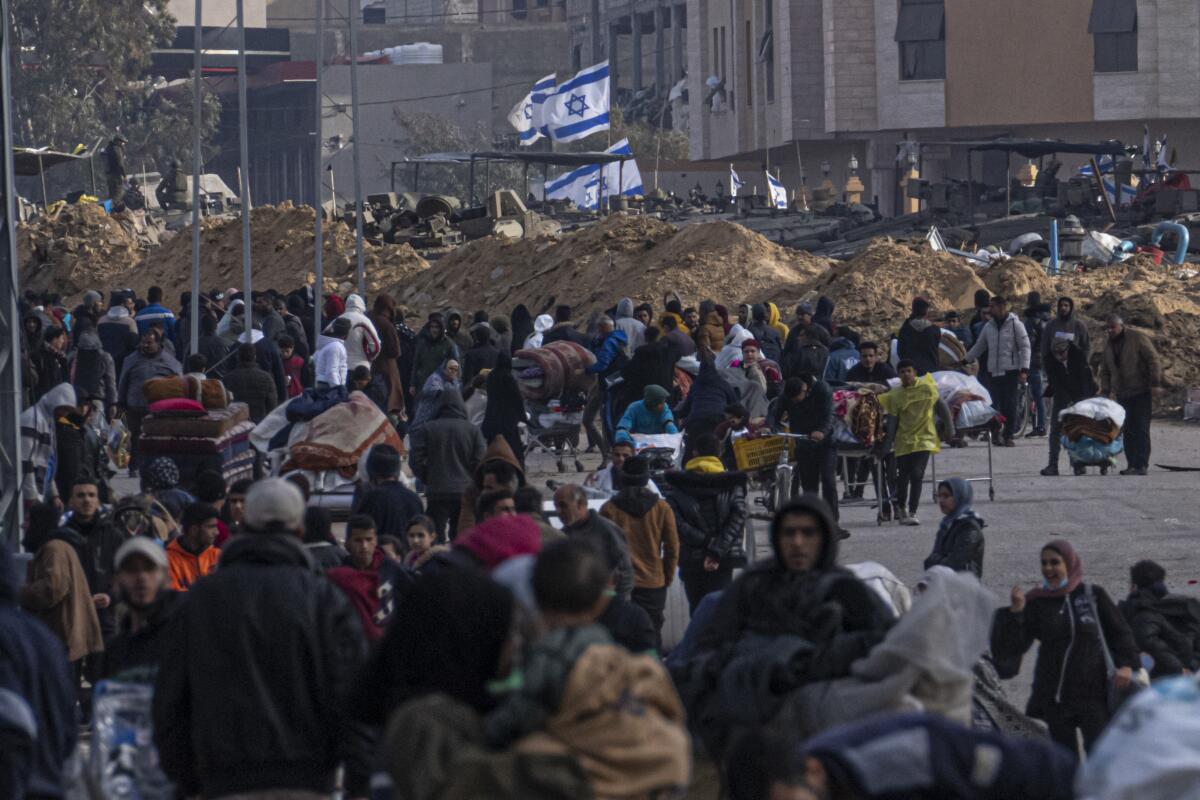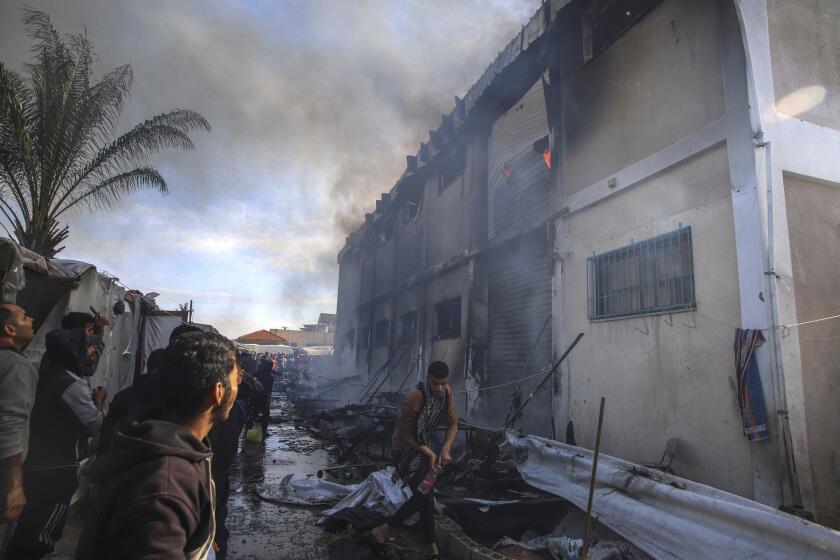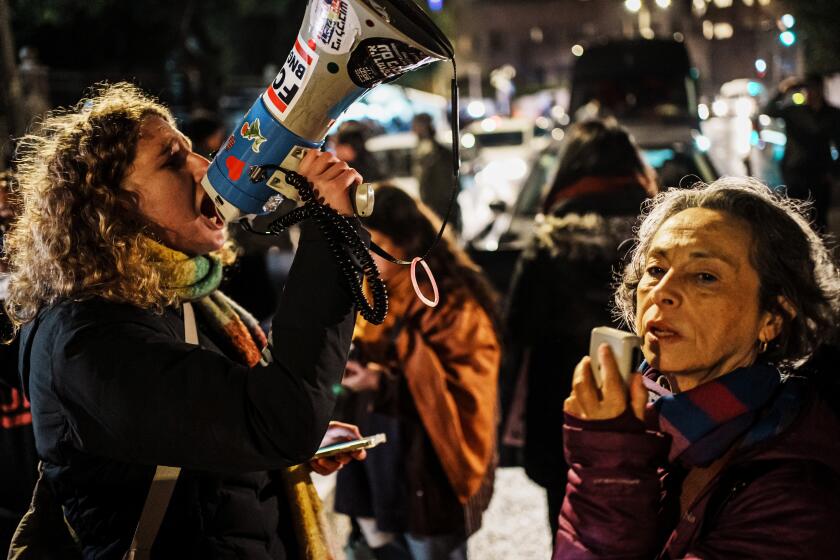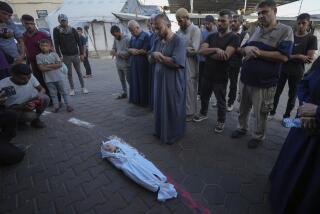Netanyahu, defiant after U.N. ruling, presses for ‘complete victory’

RAFAH, Gaza Strip — Israeli Prime Minister Benjamin Netanyahu on Saturday denounced an International Court of Justice ruling aimed at limiting death and destruction in his military’s Gaza offensive, declaring that “we decide and act according to what is required for our security” and vowing to press on until achieving complete victory.
Among the first deaths reported since the Friday ruling, three Palestinians were killed in an airstrike, according to witnesses; Israel said the strike targeted a Hamas commander.
Israel’s military is under increasing scrutiny now that the top United Nations court has asked for a compliance report in a month. The court’s binding ruling stopped short of ordering a cease-fire, but its decision was in part a rebuke of Israel’s conduct in its nearly four-month war on Gaza’s Hamas rulers.
The U.N. Relief and Works Agency for Palestine Refugees in the Near East, or UNRWA, the main organization aiding Gaza’s population amid the humanitarian disaster, said nine countries suspended their funding following Israel’s allegations that Gaza staff members had participated in the Oct. 7 Hamas attack that sparked the war. Among those countries are the United States, Britain, Italy and Finland.
The International Court of Justice’s ruling comes at an early stage in South Africa’s case alleging that Israel’s actions in Gaza amount to genocide.
Philippe Lazzarini, the commissioner-general of UNRWA, said in a statement that sanctions would be“immensely irresponsible” at such a desperate time for Gazans, especially after the agency quickly fired the “small group” of staffers who were allegedly involved in the attack.
The agency, with a staff of 13,000, relies almost entirely on contributions from U.N. member nations. It runs shelters for more than 1 million people, and its lifeline “can collapse anytime now,” Lazzarini said.
The Israel-Hamas war has killed more than 26,000 Palestinians, according to local health officials, destroyed vast swaths of Gaza and displaced nearly 85% of the territory’s 2.3 million people. The Hamas attack in southern Israel killed about 1,200 people, mostly civilians; about 250 hostages were taken.
At least 174 Palestinians were killed over the previous 24 hours, the Health Ministry in Gaza said Saturday. The ministry does not distinguish between combatants and civilians in its death tolls but has said about two-thirds are women and children.
Israel holds Hamas responsible for civilian casualties, saying the militants embed themselves in thelocal population. Israel says its air and ground offensive in Gaza has killed more than 9,000 militants.
Israel’s military said it had conducted several “raids on terror targets” in the southern city of Khan Yunis in addition to the airstrike in nearby Rafah targeting a Hamas commander.
Bilal al-Siksik said his wife, a son and a daughter were killed in the Rafah strike, which came as they slept. He said the U.N. court ruling meant little since it did not stop the war.
“No one can speak in front of [Israel]. America with all its greatness and strength can do nothing,” he said, standing beside the rubble and twisted metal that was left of his home.
More than 1 million people have crammed into Rafah and the surrounding areas after Israel orderedcivilians to seek refuge there. Designated evacuation areas have repeatedly come under airstrikes, with Israel saying it would go after militants as needed.
In Muwasi, a narrow coastal strip once designated as a safe zone but struck in recent days, displaced Palestinians in sandals tiptoed through garbage-lined puddles in damp, chilly weather. Barriers crafted from sheets and tarps billowed in the wind. A mother wept after rain leaked in and soaked mattresses and blankets.
“This is our life. We have nothing, and we left [our homes] with nothing,” said Bassam Bolbol, whose family ended up in Muwasi after leaving Khan Yunis and finding no shelter in Rafah.
As thousands of Gazans fled the fighting in Khan Yunis toward Muwasi, Israel shared video showing a crowd appearing to call for toppling Hamas.
Gaza residents expressed dismay that the U.N. court did not order an immediate end to the fighting. The case brought by South Africa alleged that Israel is committing genocide against the Palestinian territory’s people. Israel vehemently denies the allegation. A final ruling is expected to take years.
The court did order Israel to urgently get basic aid to Gaza. The U.N. and partners have said aid entering the territory remains well below the prewar daily average of 500 trucks. The U.N. says access to central and northern Gaza has been decreasing because of “excessive delays” at checkpoints and heightened military activity.
The UNRWA did not immediately comment on how operations would be affected by countries suspending funding, nor did it comment on details of the allegations against staffers. The agency has sheltered hundreds of thousands of people during the war and has helped to provide medical care.
The World Health Organization and Doctors Without Borders have issued urgent warnings about the largest health facility in Khan Yunis, Nasser Hospital, saying staff could barely function with supplies running out and intense fighting nearby.
WHO footage showed patients being treated on blood-smeared floors as frantic loved ones shouted and jostled. Cats scavenged on a mound of medical waste.
“These are the only painkillers left we have. If you want to count them, they are only for maybe five or four patients,” Dr. Muhammad Harara said.
Ashraf al Qidra, spokesperson for Gaza’s Health Ministry, said in a statement that Nasser Hospital lacked anesthesia and other medicines for intensive care units and had “dangerous” shortages of blood.
The United States, Israel’s closest ally, has increasingly called for restraint and for more humanitarian aid to be allowed into Gaza, while supporting the offensive.
More mediation lies ahead in search of a deal to secure the release of hostages held in Gaza in exchange for a pause in the fighting. More than 100 were released in a swap for Palestinian prisoners during a weeklong cease-fire in November. An unspecified number of the remaining 136 hostages are believed to be dead.
More than three months into the Israel-Hamas war, the families of hostages held in Gaza have grown disillusioned with Israel’s military operations.
CIA Director William Burns will meet in Europe with the heads of the intelligence agencies of Israel and Egypt and with the prime minister of Qatar, according to three people familiar with the matter who insisted on anonymity to discuss the sensitive talks.
Netanyahu in his address said he would not take back “a single word” of his earlier criticism of Qatar, again accusing it of funding Hamas and hosting its leaders.
“If they position themselves as a mediator, so please, let them prove it and bring back the hostages, and in the meantime deliver the medicines to them,” he said.
While the prime minister’s comments appeared to be aimed at his right-leaning base of supporters, other Israelis again gathered in Tel Aviv and outside Netanyahu’s residence in Jerusalem to call for new elections, frustrated with the government’s failure to bring all hostages home.
Hamas has said it will release the hostages only in exchange for an end to the war and the release of large numbers of Palestinian prisoners held by Israel.
Shurafa reported from Deir al Balah, Gaza Strip. Aamer Madhani, Matthew Lee and Zeke Miller in Washington, Julia Frankel in Jerusalem and Elena Becatoros in Athens contributed to this report.
More to Read
Sign up for Essential California
The most important California stories and recommendations in your inbox every morning.
You may occasionally receive promotional content from the Los Angeles Times.












